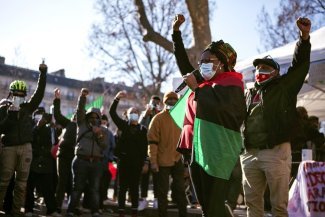In August, the Brazilian city of Rio de Janeiro is set to receive one million visitors for one of the most widely covered events of 2016. The police and armed forces are going to have to meet the twofold challenge of ensuring the safety of the visitors and sports delegations at the same time as respecting the rights of the local people.
The security policy adopted combined with the figures on police violence in recent years have, however, given NGOs and observers cause to doubt the exemplarity of the police’s conduct and operations during the Olympic and Paralympic Games.
No fewer than 85,000 representatives of the security forces will be deployed throughout the competition to ensure public safety in Rio de Janeiro: the civilian police, military police, soldiers from the National Public Security Force (a special unit of the Justice Ministry), members of the armed forces and even security brigades funded by private interests (e.g. the “Security Present” operation launched in partnership with a traders’ association), not to mention the latest generation of armoured vehicles, the canine teams, anti-bomb robots and drones.
All of this will be coordinated by the Extraordinary Secretary for the Security of Major Events (SESGE), set up specifically for such occasions by the Ministry of Justice, which, in Brazil, covers some of the areas that would usually come under the remit of the Interior Ministry.
For professor and researcher on public security policies, Antônio Falvio Testa, from the University of Brasilia, the country is ready to host the sporting event from a security perspective. “Everything should run smoothly, in the same way as the World Cup, the Federations Cup and World Youth Day went by without any trouble,” he tells Equal Times.
“It is not so much the risk of terrorism coming from the outside that is the problem but the internal threat of criminal organisations.”
From the moment the city of Rio de Janeiro was awarded the Olympics, in 2009, the organisers, the public authorities and the Olympic Committee raised the public security issue. Brazil has one of the world’s highest armed violence and homicide rates - outside of a war zone.
Almost 60,000 murders were registered in 2014, according to the Atlas of Violence published by the Brazilian Forum for Public Security. Despite the efforts of recent years, the crime and violence statistics are not improving and, according to the Institute for Public Security (ISP) a governmental organisation, the figures for theft and armed assault were on the rise in early 2016.
“Social cleansing”
Human rights organisations denounce the high rate of homicides perpetrated by the police, under circumstances that are not always legitimate or properly investigated.
According to the local branch of Amnesty International, the security operations aimed at reducing crime and pacifying the favelas in the run-up to events such as the World Cup or the Olympics pose a threat to the local population.
During the seven years of preparations, “2,500 people have been killed by the police in the city of Rio alone, and justice has only been served in a negligible number of cases”, said Atila Roque, executive director of Amnesty Brazil, on the release of the latest report published by the NGO.
Worse still, there have been several reports of “extrajudicial executions”, that is, situations where the victims were neither armed nor part of a rebellion. According to the NGO, over the last ten years, the police have killed almost two people a day, on average.
Aside from the killings, human rights defenders also denounce the unlawful detention of homeless people, young black and poor people heading to the beach, as well as the controversial and heavy-handed evictions, which have led organisations such as the United Nations to speak of “social cleansing” in the city. An alarming number of these cases involve minors.
According to lawyer Karina Quintanilha, who defends victims of police violence in São Paulo, there is a "drive to create a climate of fear among those the authorities consider ‘enemies’ of public order in the run-up to such events". Together with the collective Mães e Pais em Luta (Mothers and Fathers in struggle), she has recently taken the case of the violence perpetrated against school students to the Inter-American Commission on Human Rights in Washington DC.
“We have been witnessing heightened repression since the mass protests of June 2013, not only on the part of the police but also the political and judicial authorities.”
Alexandre de Moraes, the new Justice Minister appointed by the interim government in May following the ousting of Dilma Rousseff, is the representative of this hard line. “In his previous post as Secretary for Public Security in the state of São Paulo he invested heavily in anti-riot equipment, developed new tactics for maintaining public order and reinforced the growing criminalisation of protest actions,” reports Karina Quintanilha.
“It is as if the state of São Paulo had been his testing ground. And no one knows what he could do on the scale of Brazil.”
The interim government is currently in place for an undetermined period. But one thing is certain, the security laws passed under President Dilma Rousseff will still be in force during the Olympic Games and they are already a worry for activists and demonstrators.
The Anti-terrorism law, approved in March, is a particular cause for concern among organisations such as Artigo 19, which campaigns for respect for freedom of expression, opinion and assembly.
As Camila Marques, a lawyer working for the organisation, explains, “The legislation is dangerous, as it is vague and leaves judges with too wide a margin for interpretation. It was voted in far too hurriedly and without public debate.”
Certain actions such as denouncing abuses linked to the preparations for the Games could now fall under this law, which represents a threat to freedom of opinion.
Moreover, emergency legislation passed at the request of the IOC, the General Law of the Olympic Games, will also restrict freedom of movement and assembly in certain areas and sets out penalties of up to one year in prison for those using or misusing the “Olympic brand” for critical ends.
For Camila Marques, “Major sporting events have, unfortunately, always struggled to respect human rights, and the same applies in countries other than Brazil.”









